Table of Contents
The cybersecurity industry has become more critical than ever as the digital world expands and cyber threats grow more sophisticated. In 2025, cybersecurity professionals are expected to navigate a landscape influenced by emerging technologies like artificial intelligence (AI), machine learning, cloud computing, and quantum computing. Companies across the globe are desperately seeking skilled cybersecurity professionals to protect their networks, systems, and sensitive data from increasingly advanced and automated cyberattacks.
To break into this lucrative field or progress in your career, a structured Beginner Cybersecurity Certification path is essential. This certification will guide you through gaining the right skills, knowledge, and credentials to succeed in an ever-evolving industry.
What Is the Cybersecurity Certification Path?
The cybersecurity certification path refers to a structured approach to acquiring industry-recognized credentials that validate your skills across core cybersecurity domains. These certifications demonstrate your expertise in areas such as ethical hacking, incident management, cloud security, and governance. A well-constructed certification path allows you to gradually build your expertise and prepare for the high-demand cybersecurity roles of 2025.
As cybersecurity challenges become increasingly complex, certifications will be more critical than ever. Professionals in the field will be expected to handle the integration of cutting-edge technologies such as AI-driven threat detection, quantum-safe encryption, and securing decentralized infrastructures. A structured certification path ensures you are prepared for these innovations and can handle the new challenges they bring.
Why Does the Cybersecurity Certification Path Matter?
Following a structured certification path ensures organized career growth, helping professionals advance systematically. Certifications build enhanced employer trust, proving expertise and commitment to security best practices. They also foster adaptability in a rapidly changing industry, equipping individuals with the latest skills to combat evolving cyber threats. Additionally, certified professionals enjoy a higher pay potential, as employers value their verified knowledge and expertise.
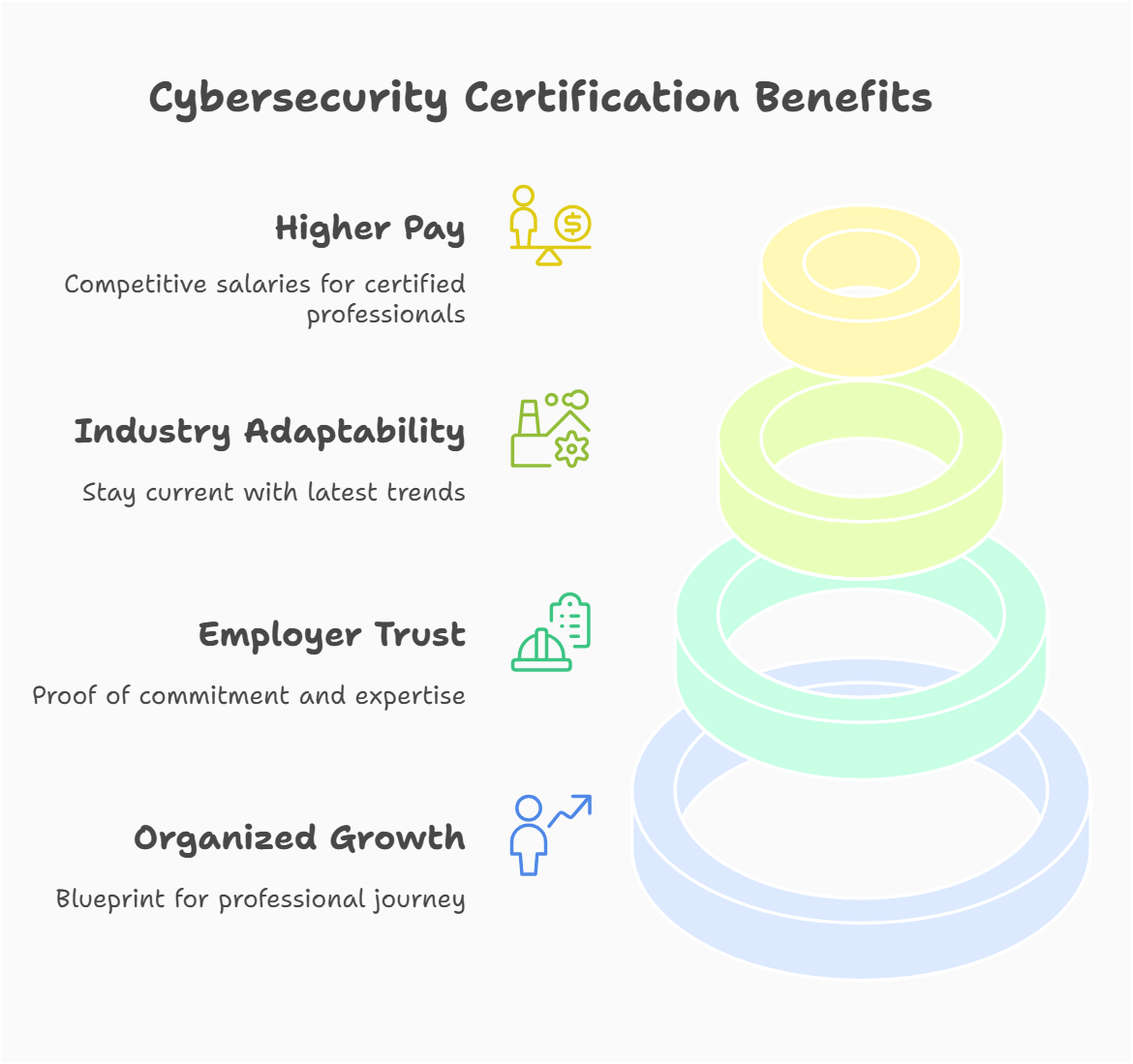
Organized Career Growth
A cybersecurity certification path serves as a blueprint for your professional journey. It helps you avoid wasting time on certifications that don’t align with your career goals or current skill level. By mapping out your certification plan, you ensure that you are always progressing toward your end goal, building knowledge and expertise in stages.
In 2025, cybersecurity professionals must be agile, able to rapidly adapt to emerging threats, and equipped to handle new technologies like quantum computing and AI-enhanced security tools. By following a certification path, you are better positioned to handle the inevitable changes in the industry and enhance your career growth.
Enhanced Employer Trust
In an era where cyber threats are more common and dangerous than ever, employers are looking for individuals they can trust to safeguard their sensitive information. Certifications provide tangible proof of your commitment to the cybersecurity profession and your expertise in dealing with sophisticated threats. A structured path helps demonstrate your abilities and reassure employers that you have the right qualifications for the role.
By 2025, employers will be especially interested in cybersecurity professionals who understand how to integrate AI, automation, and machine learning tools into their security practices. Certifications focused on these new areas will make you a highly sought-after candidate.
Adaptability in a Rapidly Changing Industry
The cybersecurity industry is continually evolving, with new threats and technologies emerging at a rapid pace. A well-structured certification path allows you to stay current with the latest trends and tools. For instance, as the need for cloud security specialists grows, certifications in cloud security or the Certified Cloud Security Professional (CCSP) are becoming more valuable.
Adapting to new threats, such as AI-driven attacks or advanced ransomware, will be essential in 2025. By following an organized certification path, you’ll ensure that you remain relevant in the cybersecurity job market and well-equipped to handle emerging challenges.
Higher Pay Potential
Certified professionals in cybersecurity often command higher salaries than their non-certified counterparts. The increasing demand for qualified cybersecurity experts means that professionals with the right certifications have the potential to earn competitive salaries. This is especially true for individuals who specialize in areas like cloud security, ethical hacking, and risk management.
As cybersecurity threats become more complex in 2025, professionals who can secure new technologies, such as AI-powered systems or blockchain-based platforms, will be rewarded with even higher salaries. Following the right certification path ensures you’ll develop the skills necessary to earn those top-paying roles.
Crafting the Ideal Cybersecurity Certification Path for 2025
Start by assessing your current skills and career goals to choose the right certification path. Align certifications with your experience level, from entry-level to expert. Gain hands-on experience to reinforce knowledge and enhance practical skills. Stay updated with industry trends to adapt to evolving cybersecurity challenges.
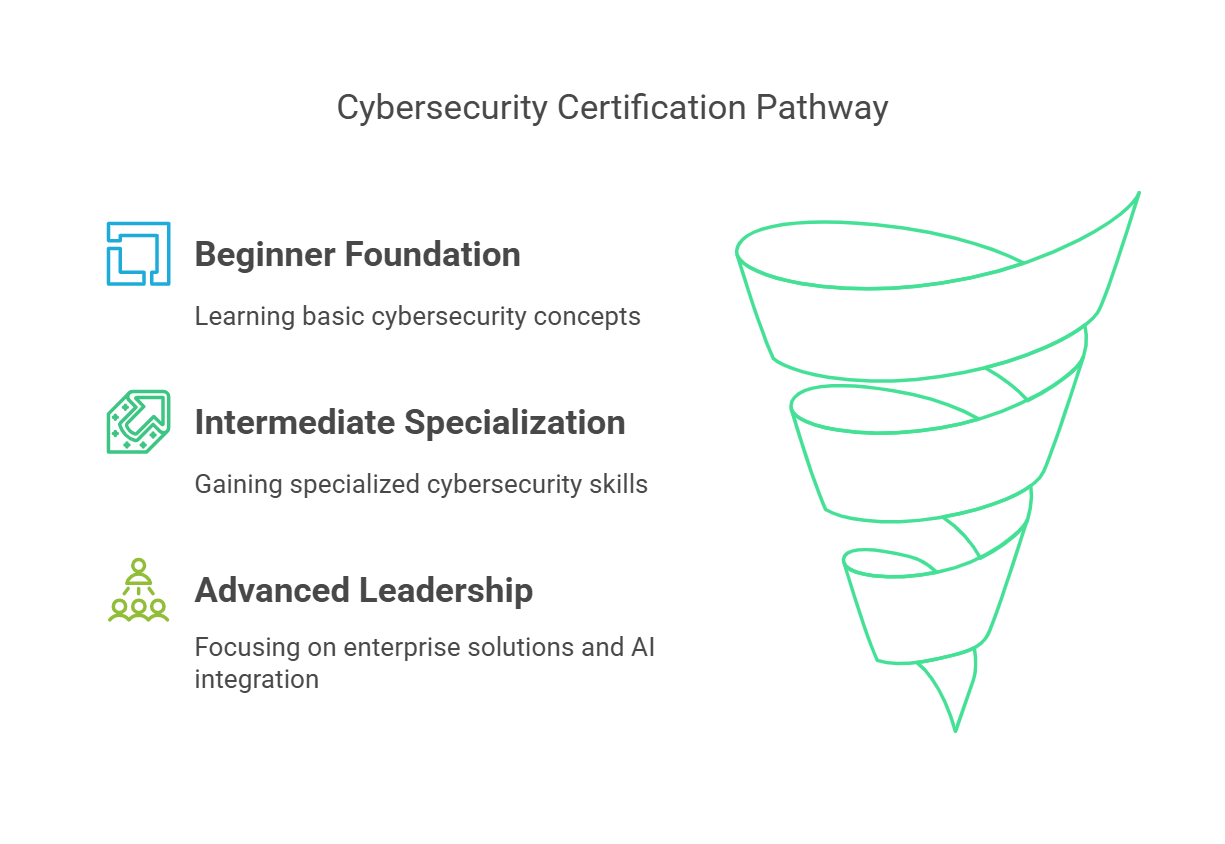
Step 1: Define Your Starting Point
Before embarking on your Cybersecurity Certification Roadmap, it’s important to assess your current skill level and career goals. The starting point will vary depending on whether you’re entirely new to cybersecurity, have prior IT experience, or have worked in related fields such as network administration or system administration.
-
Beginners should start with foundational cybersecurity knowledge, focusing on basic concepts like threat detection, network security, and incident response. As digital threats become more advanced in 2025, beginners will also benefit from gaining an understanding of cloud infrastructure security and the importance of machine learning in threat detection.
-
Intermediate professionals who already have a foundational understanding of IT or cybersecurity should pursue certifications that offer specialized knowledge in areas like ethical hacking, cloud security, and data protection.
-
Advanced professionals who have hands-on experience and certifications at the intermediate level can focus on leadership roles, enterprise cybersecurity solutions, and governance. For 2025, this may also include a focus on AI-driven security management, integrating advanced tools into enterprise environments.
Step 2: Match Certifications to Your Career Stage
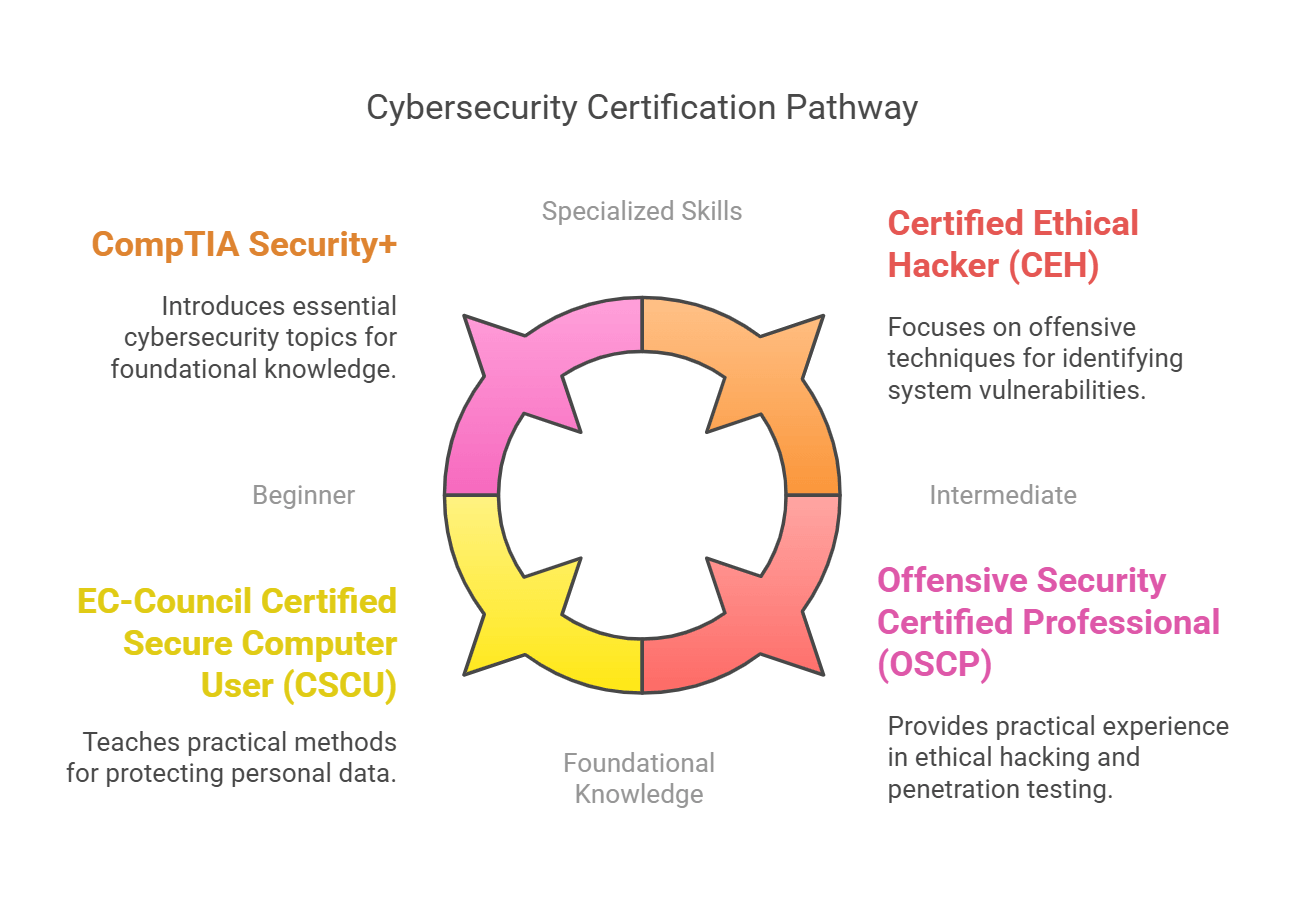
Beginner-Level Certifications
For those new to cybersecurity, starting with foundational certifications will help you gain the basic knowledge and skills needed to secure a role in the field. These certifications focus on understanding security protocols, managing risks, and identifying common cyber threats.
Key Beginner Certifications:
-
CompTIA Security+ – Offers an introduction to cybersecurity, covering essential topics such as network security, cryptography, and risk management.
-
EC-Council Certified Secure Computer User (CSCU) – Teaches practical methods to protect personal data and systems, ideal for those entering the cybersecurity field.
-
GIAC Security Essentials Certification (GSEC) – Focuses on the basics of cybersecurity, helping professionals understand and mitigate common cyberattacks.
Career Opportunities Include:
-
Cybersecurity Analyst
-
IT Security Specialist
2025 Insight: With the growth of cloud-based infrastructures and hybrid work models, beginners should also consider gaining knowledge of cloud security fundamentals and best practices for securing remote systems.
Intermediate-Level Certifications
Intermediate certifications provide deeper insights into areas like ethical hacking, penetration testing, network design, and vulnerability assessments. These certifications are ideal for professionals who have foundational knowledge and are looking to specialize further in a specific area.
Top Intermediate Certifications:
-
Certified Ethical Hacker (CEH) – Focuses on offensive techniques to identify vulnerabilities and weaknesses in systems.
-
Certified Information Systems Security Professional (CISSP) – A globally recognized certification that covers a wide array of security domains, including asset security, identity management, and risk management.
-
Offensive Security Certified Professional (OSCP) – Offers practical experience in penetration testing and ethical hacking, equipping professionals to simulate real-world hacking scenarios.
Career Opportunities Include:
-
Penetration Tester
-
Security Consultant
2025 Insight: Intermediate professionals should focus on certifications that provide expertise in securing cloud-based systems, AI-based security solutions, and advanced penetration testing tools that target emerging threats.
Advanced-Level Certifications
Advanced certifications are geared toward professionals aiming for leadership or enterprise-level roles. These certifications focus on cybersecurity governance, security architecture, cloud security, and risk management. Advanced professionals often take on strategic roles in organizations, overseeing large-scale cybersecurity infrastructures.
Key Advanced Certifications:
-
Certified Information Security Manager (CISM) – Focuses on security governance, management, and leadership, preparing professionals for executive-level roles.
-
Certified Cloud Security Professional (CCSP) – Specializes in securing cloud environments, which is crucial as more organizations transition to cloud platforms.
-
GIAC Security Expert (GSE) – One of the highest certifications in cybersecurity, demonstrating mastery of advanced security techniques and strategies.
Career Opportunities Include:
-
Chief Information Security Officer (CISO)
-
Cybersecurity Architect
2025 Insight: As cloud computing continues to evolve, advanced professionals will be expected to manage hybrid infrastructures, integrate AI into security management, and ensure the integrity of cloud-based platforms.
Step 3: Combine Knowledge with Real-World Experience
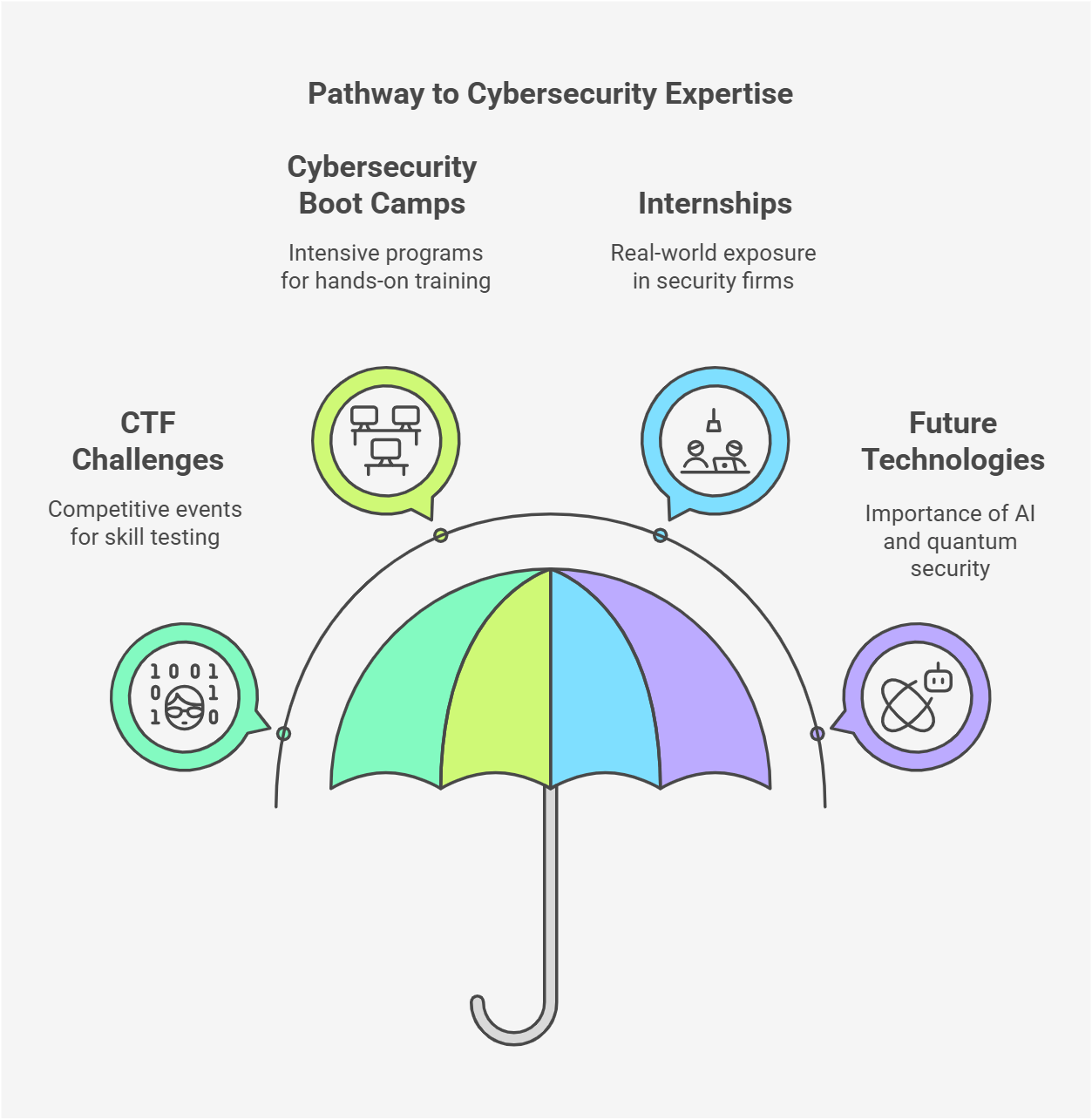
Certifications validate your knowledge, but practical experience is what truly solidifies your expertise. Real-world experience will help you apply your theoretical knowledge to solve complex problems and respond to live security incidents. You can gain hands-on experience in several ways:
-
Capture The Flag (CTF) challenges – These competitive events allow you to test your skills in real-world hacking scenarios.
-
Cybersecurity boot camps – Intensive, short-term programs that provide hands-on training and exposure to live environments.
-
Internships and work-study programs – Real-world exposure to security firms allows you to work with professionals and gain experience in live cybersecurity operations.
2025 Insight: With new technologies such as AI and quantum computing becoming more mainstream, gaining hands-on experience in securing AI-driven systems and understanding the implications of quantum encryption will be essential.
Step 4: Stay Current with Industry Trends
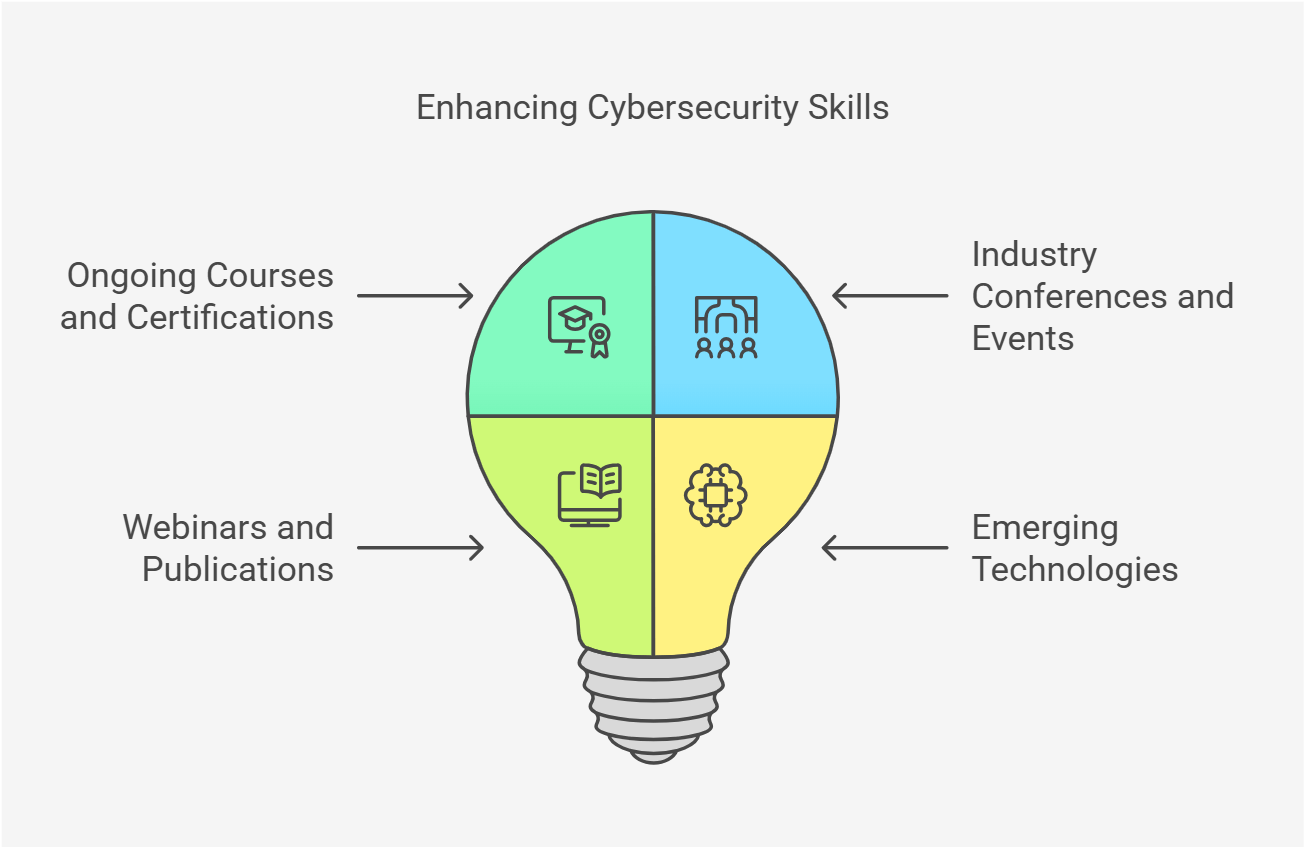
As cybersecurity continues to evolve, it’s essential to stay up-to-date with the latest trends and tools. Cybersecurity professionals should make it a priority to continually enhance their skills and certifications through:
-
Ongoing courses and certifications – Many certifications require renewal every few years, ensuring that professionals stay current with evolving cybersecurity threats and technologies.
-
Industry conferences and events – Attending conferences such as DEF CON, Black Hat, and RSA Conference will allow you to network with experts, learn about the latest trends, and gain insights into new cybersecurity technologies.
-
Webinars and publications – Engage with online resources, webinars, and industry publications to stay informed on emerging threats and new technologies.
2025 Insight: As AI, quantum computing, and machine learning continue to impact cybersecurity, staying informed on these technologies will be key to your ability to secure cutting-edge systems.
How ACSMI Enhances Your Cybersecurity Certification Path
ACSMI has been at the forefront of offering comprehensive and specialized cybersecurity training. With over 400 modules designed for all levels of professionals, ACSMI ensures that you receive the knowledge and hands-on training necessary to tackle the complexities of modern cybersecurity.
2025 Insight: ACSMI continues to evolve with the times, offering certification tracks that focus on securing AI systems, implementing machine learning for threat detection, and understanding quantum computing’s impact on cybersecurity.
Final Thoughts
A well-crafted cybersecurity certification path is the foundation for a successful career in cybersecurity, especially in 2025 when new technologies and threats emerge every day. By selecting the right certifications and gaining hands-on experience, you can position yourself to excel in the competitive and ever-changing cybersecurity job market. Start today, and secure your place at the forefront of the cybersecurity industry.
FAQs on the Cybersecurity Certification Path
1. What Is the Best Cybersecurity Certification for Beginners?
CompTIA Security+ and ACSMI’s foundational certifications are excellent choices to start building your cybersecurity career.
2. How Long Does It Take to Complete a Cybersecurity Certification?
The duration depends on the complexity of the certification. Beginner certifications generally take 3-6 months, while advanced certifications may take up to a year.
3. Are Certifications Enough to Land a Job?
While certifications are crucial, hands-on experience is just as important. Platforms like ACSMI provide practical labs that complement your theoretical learning.
4. Is ACSMI Certification Globally Recognized?
Yes, ACSMI certifications are recognized worldwide for their real-world applicability and comprehensive curriculum.
5. Can I Follow More Than One Path?
Absolutely! In 2025, it’s common for professionals to specialize in multiple areas, such as ethical hacking, cloud security, and AI-driven cybersecurity solutions.
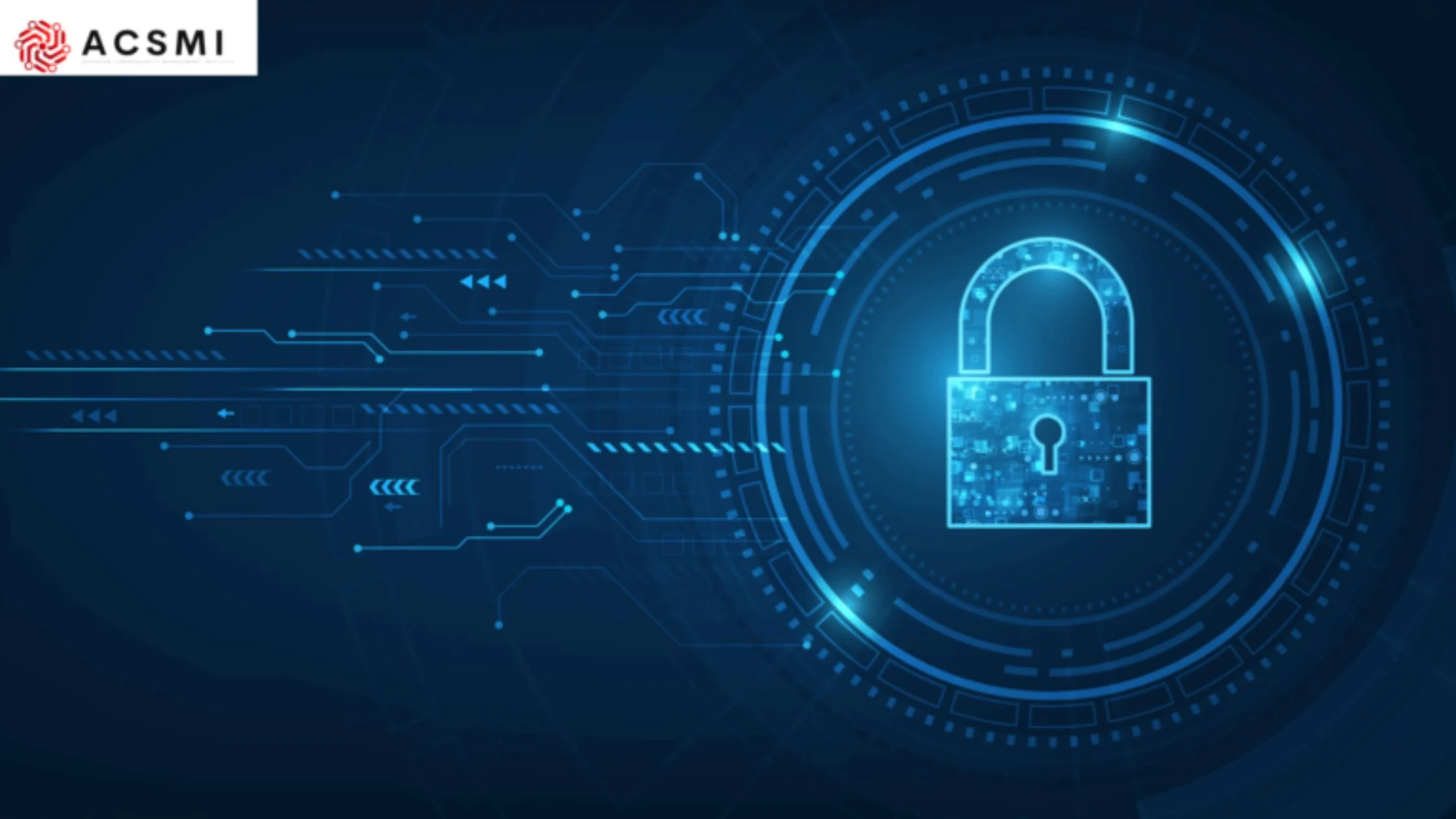
Leave a Reply